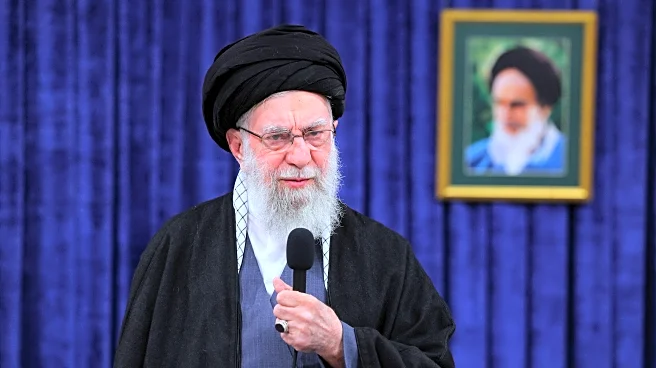What's Happening?
President Trump is undertaking a $250 million project to construct a 90,000-square-foot ballroom on the White House grounds, specifically in the East Wing. This project is being funded entirely through
private donations, with significant contributions from major tech companies such as Amazon, Apple, Google, Meta, and Microsoft. Additionally, defense companies like Palantir and Lockheed Martin, as well as telecom providers like Comcast and T-Mobile, are also contributing. The crypto industry is represented among the donors, with funds coming from entities like Coinbase, Ripple, Tether America, and the Winklevoss twins. The exact amounts contributed by each donor remain undisclosed, although it is noted that at least $20 million from Google is part of a settlement related to YouTube's suspension of Trump's account following the January 6, 2021, riots.
Why It's Important?
The funding of the White House ballroom project by major tech companies signifies a shift in the relationship between Silicon Valley and President Trump. Initially resistant to Trump during his first term, the tech industry appears to have aligned more closely with his administration during his second term. This alignment may be influenced by the Trump administration's less aggressive stance on antitrust enforcement compared to the previous administration under President Joe Biden. The tech industry's cooperation could also be motivated by Trump's supportive policies towards AI development, which include reducing regulatory barriers and increasing government funding for data center construction. This project highlights the growing influence of tech companies in political and governmental affairs, as well as their strategic interests in aligning with current administration policies.
What's Next?
As the construction of the ballroom progresses, it is likely that the relationship between the tech industry and the Trump administration will continue to evolve. The administration's policies on AI and antitrust enforcement will be closely watched by industry stakeholders, as these could significantly impact their operations and strategic decisions. Additionally, public and political reactions to the private funding of a government project may prompt discussions on the role of corporate influence in political affairs. The completion of the ballroom could also set a precedent for future privately funded projects within government premises.
Beyond the Headlines
The involvement of tech companies in funding a government project raises questions about the ethical implications of corporate influence in politics. While the donations are legal, they may lead to concerns about potential conflicts of interest and the extent to which corporate contributions can sway political decisions. This development also reflects broader trends of increasing corporate involvement in public policy and governance, which could have long-term implications for democratic processes and accountability.











